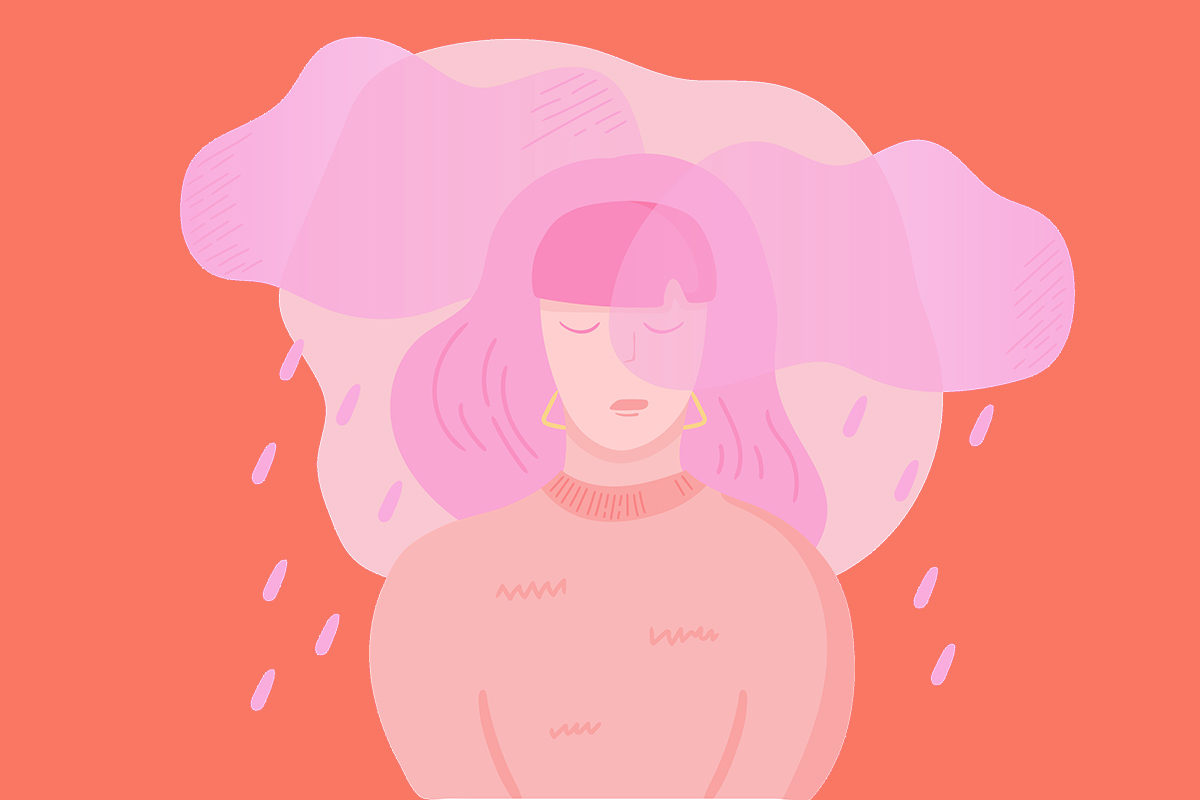When I first decided to write about postpartum depression and anxiety, I found myself writing about how I felt after it passed. After all, I had lived through it, and I wanted other mamas to know that it — postpartum depression and anxiety, that is — does not last forever. I got better, so they could, too.
After working on a few pieces, I received some feedback from an editor, who essentially said: Instead of writing about what came after it, why not write about it, itself?
Truthfully, I was scared of revisiting it. It’s so much easier to write about the happy ending — but my happy ending has meaning because of the struggle that preceded it. And so, uncomfortable as it might be, I offer my own experience with postpartum depression and anxiety, in the hopes that even one mama might find comfort in my story.
My postpartum depression and anxiety likely began brewing during my pregnancy. I found pregnancy exciting but unnerving — too many questions and not enough answers. I’m very Type A; I like to be organized and control my world around me. Pregnancy, however, represented a lack of control. Everything was changing, and I found it overwhelming. With two pregnancy complications — gestational diabetes and symphysis pubis dysfunction, a very particular type of pelvic pain — I was inundated with needle pricks, extra doctor appointments, physical therapy, and heightened anxiety.
And then, my baby came! Labor itself wasn’t difficult for me, but when C arrived, I didn’t feel the way I thought I would. Or should. (FYI, “should” is really unhelpful in motherhood.) I was quite shocked from the whole medical experience and felt wholly unprepared for what came next: very little sleep, difficulty breastfeeding, and the isolation of maternity leave. Gone were my Zumba classes, reading the news on the metro to D.C., and coffee with work friends. In their place was the expectation to enjoy every minute (impossible!), love maternity leave (not me!), be the best mom ever (what does that mean?), and instantly and comfortably take on my new identity as a mother (this took time).
As postpartum anxiety and depression took root, my day-to-day life was a mix of joy with underlying overwhelm and fear. I sang songs to C and took cute photos, but at the same time, I worried, and then I worried some more. Was she eating enough? Was I changing her enough? Did I set her crib up properly so she wouldn’t die in the night of SIDS? Were we bonding? When the **** would my husband get home from work and relieve me? Would I ever sleep again?
Eventually, I became so overcome by fear that when night came, I would hide from my husband and C, watching her on the monitor from another floor. I was too scared to face her; my neck, hands, and wrists ached from repetitive bottle-making and holding C during the day. I will never be able to thank my husband sufficiently for his support during this time, because although I was the one with parental leave, he went to work during the day and cared for C at night when I just couldn’t.
I justified my mental state with a series of “justs.” I just needed a nap. I just needed a little break. I just needed to go back to work. I just needed some exercise. I just needed to see friends. I just needed my mom. I just needed my house tidied up. I was just a new mom, and being a new mom was just hard. I should just suck it up.
I started to accept that it was more than “mommy blues” when insomnia set in and I began having panic attacks for the first time in my life. Some nights I only slept one or two hours (while C slept peacefully) and this led to being up all night pacing like Lady MacBeth, as my mom would say. I couldn’t sleep because I was so frightened of what the next day would bring. How would I get through the day when I was shaky and nauseous from lack of sleep? How would I drive anywhere when C screamed in the car the whole time? Why did other moms seem to handle everything so much more easily than me (operative word: seem)?
The panic attacks were complete system takeovers — I couldn’t catch my breath, I couldn’t think. I fell to the floor in desperation, holding my chest and squeezing my eyes closed as I wailed with primal pain. The fear was so extreme that I begged to go away, to go anywhere, maybe to the hospital? Could they help me? I wanted to run away from my life, from the walls of my home where I felt so trapped, from the awesome responsibility of caring for a child who couldn’t survive without my care.
I’d hit rock bottom. My husband was scared, my parents were scared, I was scared. But in the midst of this chaos, I reached deep inside to find my go-getter self, and I got to work. It had gone too far. I began searching for support groups for postpartum depression and anxiety (PPD/A) and, as luck would have it, I found two local groups. There, I found other moms suffering from similar feelings, and learned to name my symptoms: trouble sleeping, fatigue, anxiety, doubting my ability to care for my baby, panic attacks and feeling overwhelmed. I learned that symptoms could be treated, and that blame and guilt were of no use.
A group leader provided me with names of therapists who focused on PPD/A and I made an appointment that very week. And with my doctor, I began medicines that would help me sleep, and relieve intense panic in the short term, as well as depression and anxiety in the long term.
From then on, my mission was to make it to every.single.appointment. I was ready to combat it. I am so grateful to my husband and friends and family who stepped in and stepped up so I could take the time I needed to begin to get better.
Certain habits helped me feel grounded: My number one priority was sleep. I used a sound machine, listened to an evening meditation on YouTube, and took medicine for a time until sleep became regularized again. Next, I prioritized appointments with my doctor, therapist, and the support groups. I humbled myself, admitting to friends and family that our new, little family needed help.
Friends and family helped us get through what was the hardest time of our lives, and for that we will forever be appreciative. We found a loving daycare provider and caring babysitters to fill in the gaps as I transitioned back to my full-time job. At work, I felt like myself again, which helped me to build back my confidence.
Finally, I jotted down notes — some advice from others and some positive thoughts of my own — which I read to myself over and over again during difficult moments:
On Sleep and Facing the Day
I feel tired and miserable right now, but no one dies from those things. Everyone sleeps eventually. The worst thing that can happen if I don’t sleep tonight is I’ll be tired.
No one can save me and I can’t escape this feeling right this second, but I always feel better later in the day.
I know that mornings are the worst and they are scary and uncomfortable. Hug the dog, watch stupid TV, and wait for things to get easier.
Help the baby get ready, get dressed, and get out of the house. I always do better when I move around.
On Depression and Anxiety
Anxiety is a normal part of life.
Postpartum depression and anxiety is temporary. I won’t feel like this forever.
This is like the flu; I feel bad now but it will go away.
There are no 50-years-olds walking around with postpartum depression and anxiety.(Thanks for this one, Mom!)
Postpartum depression and anxiety comes in waves but everyone gets better. I will get better. I will have more moments where I feel like me and I am happy.
On Being a Mom and a Wife
The baby is being cared for; her needs are being met. It’s OK to take time for myself.
My husband is also tired and stressed out, so we need to be a team and be kind to each other.
I am lucky; I love my husband and my ridiculously wonderful baby and I have family and friends who love me.
On the Future
I have so many wonderful things to look forward to.
Hold on, don’t give up, this will pass.
And little by little, it went away.








